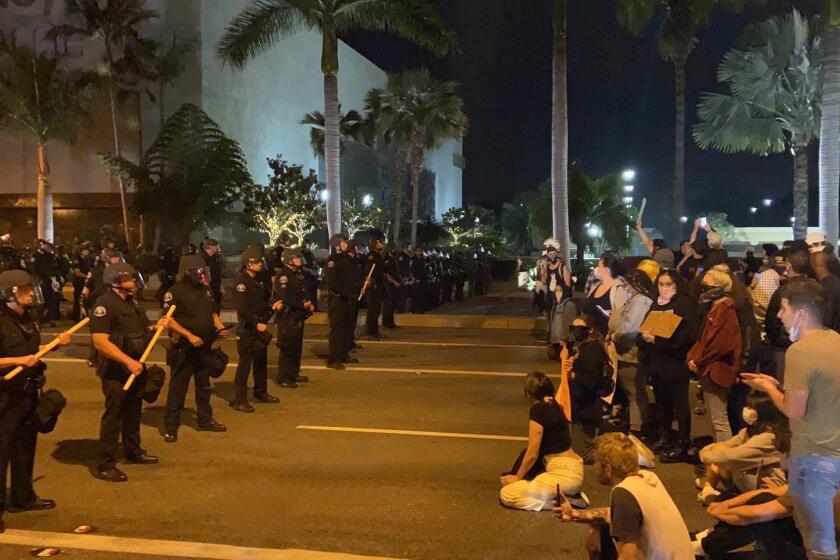UC Irvine panel discusses mourning, anti-black violence in response to Black Lives Matter protests, COVID-19
- Share via
They began with Toni Morrison.
“In this here place, we flesh; flesh that weeps, laughs; flesh that dances on bare feet in grass,” read Tiffany Willoughby-Herard, an associate professor of African American studies at UC Irvine, at the start of an hourlong discussion on anti-Black violence, racism and the act of mourning Wednesday.
“Love it. Love it hard. Yonder they do not love your flesh. They despise it. They don’t love your eyes; they’d just as soon pick ‘em out,” Willoughby-Herard read from Morrison’s “Beloved.” “No more do they love the skin on your back.”
The discussion entitled “Yonder they do not love your flesh,” named after the quote from Morrison’s “Beloved,” was moderated by Judy Tzu-Chun Wu, the faculty director of the Humanities Center.
It was held virtually on Zoom and on Facebook Live.
The panel featured speakers Willoughby-Herard, Jessica Millward, an associate professor of history, and Sabrina Strings, an associate professor of sociology.
“We are experiencing not just physical isolation but also social isolation,” Wu said. “We need a space to collectively learn and process the inhumanity that is evident in our society and to assert our desire for justice and compassion. This is what I believe is the role of the humanities, to explore and claim our common humanity.”
Wu said the panel was held in response to ongoing violence against black people and the recent deaths of George Floyd, Breonna Taylor and Ahmaud Arbery, which sparked protests across California and the country.
“It is also a response to the repression and brutality of [treatment to] protesters seeking to assert that Black Lives Matter,” Wu said.
“We received an overwhelming response of interest, and it really heartens me to know there are so many [viewers] concerned, outraged [and] want to be part of a community to talk about these issues,” Wu said, adding that the center received over 900 RSVPs for the event. Zoom capped off at 500 attendees.
The Orange County Sheriff’s Department is reviewing the conduct of a deputy working at a Costa Mesa protest Tuesday seen wearing a badge supporting the far-right militia organization, the Three Percenters.
Speakers responded to questions of the disproportionate amount of COVID-19-related deaths of black people, the history of policing, public mourning, with Millward describing mourning as “an act that accompanies every aspect of African American history, from slavery through its afterlife.”
Millward said that she had been practicing self-care in order to process “the anxiety and trauma linked first to COVID. By the time Ahmaud Arbery, Breonna Taylor and George Floyd were all murdered, I was already ready to borrow from [civil rights activist] Fannie Lou Hamer’s ‘sick and tired of being sick and tired.’”
“I won’t speak for every black person. I will just speak for those in my circle, who I speak with,” Millward said.
Millward said that scholars, historians and laypeople need to be committed to struggling for radical social justice and give themselves the permission to grieve, to be angry and to practice “radical self-care” by turning off the news or electing to not provide commentary to news stations unless they decide to.
Strings said she looked forward to the panel to process her feelings on what has been happening as it relates to not only the pandemic but to the protests, going on to discuss a lack of affordable healthcare available and its correlation to black people dying as a result of COVID-19.
An hours-long standoff between protesters and police took place Monday night at South Coast Plaza, with demonstrators asking police to “take a knee.”
Willoughby-Herard drew upon the history of violence against black women and men to connect to current struggles.
Viewers asked questions on recommended readings, ways to have multigenerational discussions on societal change and advice on how to provide space as educators for students to grieve and actively process current events.
“It’s so frequent that I’ve been invited to speak on these issues and people have wanted to jump ahead to the solution,” Strings said. “‘Well, how do black people fix this?’ It’s not on black people’s shoulders to fix this.
“It’s on the entire community of the United States to fix this. This is an American problem that’s been going on for hundreds of years, and we’re not going to solve it in an hour. It requires years and years of work and conversations and the willingness to put in the effort,” Strings said.
All the latest on Orange County from Orange County.
Get our free TimesOC newsletter.
You may occasionally receive promotional content from the Daily Pilot.








